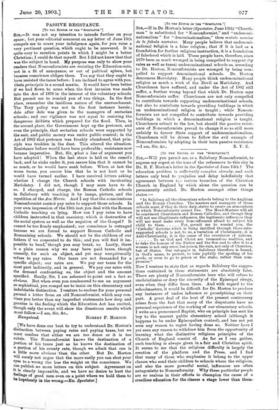PASSIVE RESISTANCE.
[To THE EDITOR OP THE “SprerAros.1 SIR,—It was not my intention to intrude further on your space; but your editorial comment on my letter of June 13th compels me to crave your indulgence again, for you raise a very pertinent question, which ought to be answered. It is quite easy to mention points in which I might be a better Christian; I could do that myself. But I did not know that that was the subject in hand. My purpose was only to show your readers that Nonconformists are resisting the Education-rate, not in a fit of annoyance, or out of political spleen, but because conscience obliges them. You say that they ought to have resisted the taxes before : I am inclined to agree with you. °bola principiis is a sound maxim. It would have been better if we had flown to arms when the first invasion was made into the Act of 1870 in the interest of the voluntary schools. But permit me to remind you of two things. In the first place, remember the insidious nature of the encroachment. The Tory policy was not in the first instance heroic ; dole after dole was given to the managers of sectarian schools ; and our vigilance was not equal to resisting the dangerous driblets which prepared for the flood. Then, in the second place, the Government kept up the pretence, and even the principle, that sectarian schools were supported by the sect, and public money was under public control; in the Act of 1902 that pretence was frankly abandoned, that prin- ciple was trodden in the dust. This altered the situation. Resistance before would have been preferable ; resistance now became imperative. But, Sir, 'ghat a line of argument you have adopted! When the Iasi straw is laid on the camel's back, and he sinks under it, you assure him that it cannot be so much, or he would have sunk before. When at last the worm turns, you assure him that he is not hurt or he would have turned earlier. I have received letters asking whether I charge the Church schools with inculcating Mariolatry. I did not, though I may soon have to do so. I charged, and charge, the Roman Catholic schools in Salisbury with teaching it by image, picture, and the repetition of the Ave .Maria. And I say that the conscientious Nonconformist cannot pay rates to support those schools. In your own impression of the 13th inst. you deal with the Roman Catholic teaching on lying. How can I pay rates to have children instructed in that casuistry, which is destructive of the social system as well as the negation of the Gospel P It cannot be too firmly emphasised ; our conscience is outraged because we are forced to support Roman Catholic and Romanising schools. We should not be the children of our lathers if we consented to do this ; and you will find it im- possible to bend, though you may break, us. Lastly, there is a plain reason why we may have paid taxes, though uneasily, for such an object, and yet may unequivocally refuse to pay rates. Our taxes are not demanded for a specific object ; our rates are. We pay our taxes for the most part indirectly, and in general. We pay our rates with the demand confronting us, the object and the amount specified. Really, Sir, I am ashamed to point out a fact so obvious. But when even you condescend to use an argument so sophistical, you compel me to insist on this elementary and indubitable distinction. I venture to enclose for your personal Perusal a letter from an old Nonconformist, which may con- vince you better than my imperfect statements how deep and genuine is the feeling which the Education Act has excited, though only the event will show the disastrous results which must follow.—I am, Sir, &c., [We have done our best to try to understand Dr. Horton's distinction between paying rates and paying taxes, but we must confess that either we are too dense or it is too subtle. The Nonconformist knows the destination of a „Portion of his taxes just as he knows the destination of a portion of his county rate, though we admit that one is httle more obvious than the other. But Dr. Horton will surely not argue that the more easily you can shut your eyes to a wrong the less the weight on the conscience. We an publish no more letters on this subject. Agreement on It la clearly impossible, and we have no desire to hurt the 'feelings of good men even on a point where we hold them to be hopelessly in the wrong.--ED. Spectator.]










































 Previous page
Previous page